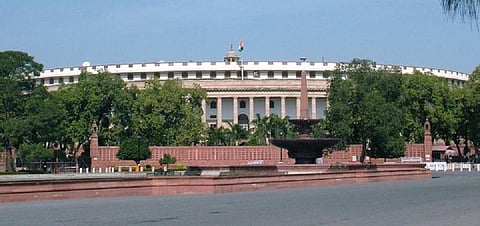

Sickle cell disease in tribal population
Sickle cell disease (SCD), a genetic blood disorder, has been affecting the tribal population in central, western and southern India. State-wise prevalence rate of sickle cell disease among the tribal population is not known in a definite manner as no such database is maintained centrally, Renuka Singh Saruta, minister of state for tribal affairs said in the Lok Sabha.
A sickle cell disease support corner has been developed in collaboration with Piramal Swasthya Management and Research Institute to create a database of individuals with SCD in tribal populations.
It helps connect these individuals to welfare schemes, disease-specific healthcare services and validated health information and enables data-driven policy insights and strategic inputs. The issue has been inter-alia taken up with chief secretary(s) letter dated June 18, 2021 via compilation of SCD data at the state level, Saruta said.
The Union Ministry of Tribal Affairs had given funds for screening of tribal students in collaboration with the Indian Council of Medical Research. Workshops were conducted in states in collaboration with Department of Biotechnology for mapping of incidences of sickle cell trait.
Of the 11,383,664 persons screened as reported by various states, about 8.75 per cent (996,368) tested positive (Trait: 949,057; Disease: 47,311), Saruta added.
Promotion of CNG
The Union Government is taking steps to promote green gas, such as compressed natural gas (CNG), in the country, Rameswar Teli, minister of state in the ministry of petroleum and natural gas said.
As on March 31, 2021, Gujarat had 779 CNG stations, the highest among various states / Union territories. The number of CNG stations in Maharashtra, Gujarat and Delhi is 488, 485 and 436 respectively, Teli said.
According to the Minimum Work Program assigned by Petroleum and Natural Gas Regulatory Board (PNGRB) through competitive bidding, the authorised entities will set up 8,181 CNG stations, including in Rajasthan, over a period of 8-10 years across the country, Teli added.
Tribal land in steel city
The Union Ministry of Steel said the land measuring approximately 20,983.99 acres was acquired by the Government of Odisha to enable the company to construct an integrated steel plant and township and other ancillaries at Rourkela and for the Mandira Dam Project, Saruta said in the Lok Sabha.
The land acquired by the Government of Odisha acquired under the provisions of Orissa Development of Industries, Irrigation, Agriculture, Capital construction and Resettlement of Displaced persons (Land Acquisition) Act, 1948 (Orissa Act XVIII of 1948) was handed over to RSP (erstwhile Hindustan Steel Limited) from 1955-1976.
RSP does not have any record of quantum of tribal land acquired, if any, as the same was acquired by state government. In addition, 11,144.445 acres of government land was given to RSP by the state government of Odisha, Saruta said. Rs 13,248,217 was paid to the Odisha government towards compensation for land acquired, Saruta said.
Microplastics in Ganga
Toxics Link, a non-profit, conducted a study titled Quantitative analysis of Microplastics along River Ganga, wherein it claimed high concentration of microplastic along the stretches of Ganga in Varanasi, Kanpur and Haridwar, Prahlad Singh Patel, minister of state for jal shakti and food processing industries said in the Rajya Sabha.
As on June 30, 2021, a total of 346 projects had been sanctioned under Namami Gange Programme for various activities such as sewerage infrastructure; ghats and crematoria; river front development; river surface cleaning; institutional development; biodiversity conservation; afforestation and rural sanitation, Patel said.
Charging stations for electric vehicles
The Union Ministry of Heavy Industry had sanctioned about 520 charging stations / infrastructure for Rs 43 crore under Phase-I of FAME-India Scheme. As many as 429 charging stations have been installed as on August 3, 2021.
The ministry has also sanctioned 2,877 electric vehicles (EVs) charging stations amounting to Rs 500 crore in 68 cities across 25 states / UTs under FAME India scheme phase II, Nitin Jairam Gadkari, minister of road transport and highways said in the Rajya Sabha.
E-waste collection centres
The Central Pollution Control Board (CPCB) reported that there are there are 2,808 numbers of e-waste collection centres in the country, Ashwini Kumar Choubey, minister of state in the ministry of environment, forest and climate change said in the Rajya Sabha.
Details on e-waste collected through municipality and local bodies e-waste collection centres were not available. Under the E-Waste (Management) Rules, 2016, municipal and local bodies were not required to file any annual return with respect to e-waste collected by them, Choubey said.
Around 22,404 tonnes of e-waste was collected, dismantled and recycled during the financial year 2019-20. This is based on annual reports submitted by 35 State Pollution Control Boards (SPCB) / Pollution Control Committees (PCCs) to CPCB.
Around 19,034.275 tonnes of e-waste was refurbished, according to the information received from 26 SPCBs during FY 2019-20, Choubey added.
National parks and sanctuaries in Kutch
As informed by the Government of Gujarat, no census was carried out in
the Kutch desert sanctuary, Kutch Bustard Sanctuary and Narayan Sarovar sanctuary during the last three years. In the Wild Ass Sanctuary,
6,082 wild asses were found, the 2020 Census found, Choubey said.
Rise in temperature due to man-made activities
The average temperature rise for 2015-2019 is currently estimated to be 1.1 degree Celsius above pre-industrial levels (1850-1900), according to a World Meteorological Organization report. According to the Ministry of Earth Sciences, the surface air temperature over India rose by about 0.7°C during 1901-2018.
This temperature rise is a global phenomenon and not confined to our country alone, Choubey said.
Reports from various sources, including the Intergovernmental Panel on Climate Change, highlighted that the challenges faced due to global warming are mainly due to cumulative historical and current greenhouse gas emissions of the developed countries.
India, with more than 17 per cent of global population, has contributed only about 4 per cent of the global cumulative greenhouse gas emissions between 1850 and 2017, Choubey said.